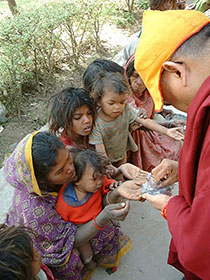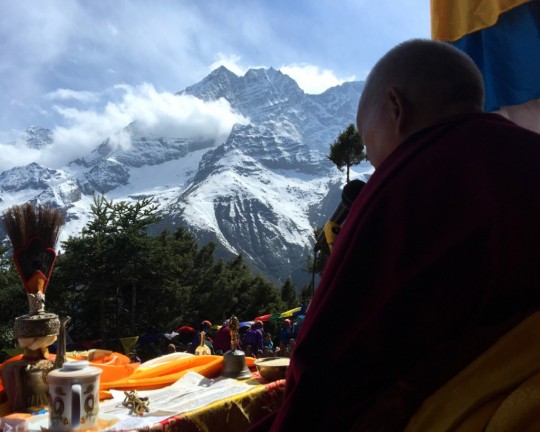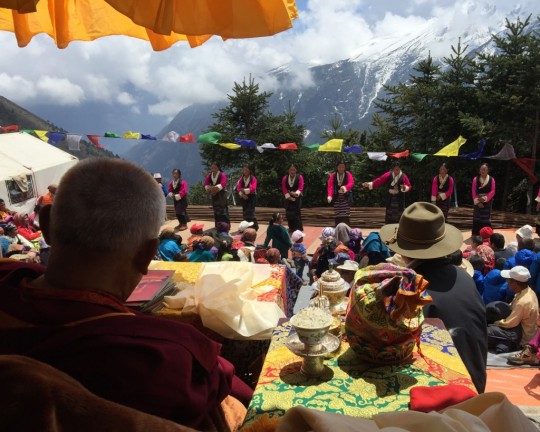- Home
- FPMT Homepage
Foundation for the Preservation of the Mahayana Tradition
The FPMT is an organization devoted to preserving and spreading Mahayana Buddhism worldwide by creating opportunities to listen, reflect, meditate, practice and actualize the unmistaken teachings of the Buddha and based on that experience spreading the Dharma to sentient beings. We provide integrated education through which people’s minds and hearts can be transformed into their highest potential for the benefit of others, inspired by an attitude of universal responsibility and service. We are committed to creating harmonious environments and helping all beings develop their full potential of infinite wisdom and compassion. Our organization is based on the Buddhist tradition of Lama Tsongkhapa of Tibet as taught to us by our founders Lama Thubten Yeshe and Lama Thubten Zopa Rinpoche.
- Willkommen
Die Stiftung zur Erhaltung der Mahayana Tradition (FPMT) ist eine Organisation, die sich weltweit für die Erhaltung und Verbreitung des Mahayana-Buddhismus einsetzt, indem sie Möglichkeiten schafft, den makellosen Lehren des Buddha zuzuhören, über sie zur reflektieren und zu meditieren und auf der Grundlage dieser Erfahrung das Dharma unter den Lebewesen zu verbreiten.
Wir bieten integrierte Schulungswege an, durch denen der Geist und das Herz der Menschen in ihr höchstes Potential verwandelt werden zum Wohl der anderen – inspiriert durch eine Haltung der universellen Verantwortung und dem Wunsch zu dienen. Wir haben uns verpflichtet, harmonische Umgebungen zu schaffen und allen Wesen zu helfen, ihr volles Potenzial unendlicher Weisheit und grenzenlosen Mitgefühls zu verwirklichen.
Unsere Organisation basiert auf der buddhistischen Tradition von Lama Tsongkhapa von Tibet, so wie sie uns von unseren Gründern Lama Thubten Yeshe und Lama Thubten Zopa Rinpoche gelehrt wird.
- Bienvenidos
La Fundación para la preservación de la tradición Mahayana (FPMT) es una organización que se dedica a preservar y difundir el budismo Mahayana en todo el mundo, creando oportunidades para escuchar, reflexionar, meditar, practicar y actualizar las enseñanzas inconfundibles de Buda y en base a esa experiencia difundir el Dharma a los seres.
Proporcionamos una educación integrada a través de la cual las mentes y los corazones de las personas se pueden transformar en su mayor potencial para el beneficio de los demás, inspirados por una actitud de responsabilidad y servicio universales. Estamos comprometidos a crear ambientes armoniosos y ayudar a todos los seres a desarrollar todo su potencial de infinita sabiduría y compasión.
Nuestra organización se basa en la tradición budista de Lama Tsongkhapa del Tíbet como nos lo enseñaron nuestros fundadores Lama Thubten Yeshe y Lama Zopa Rinpoche.
A continuación puede ver una lista de los centros y sus páginas web en su lengua preferida.
- Bienvenue
L’organisation de la FPMT a pour vocation la préservation et la diffusion du bouddhisme du mahayana dans le monde entier. Elle offre l’opportunité d’écouter, de réfléchir, de méditer, de pratiquer et de réaliser les enseignements excellents du Bouddha, pour ensuite transmettre le Dharma à tous les êtres. Nous proposons une formation intégrée grâce à laquelle le cœur et l’esprit de chacun peuvent accomplir leur potentiel le plus élevé pour le bien d’autrui, inspirés par le sens du service et une responsabilité universelle. Nous nous engageons à créer un environnement harmonieux et à aider tous les êtres à épanouir leur potentiel illimité de compassion et de sagesse. Notre organisation s’appuie sur la tradition guéloukpa de Lama Tsongkhapa du Tibet, telle qu’elle a été enseignée par nos fondateurs Lama Thoubtèn Yéshé et Lama Zopa Rinpoché.
Visitez le site de notre Editions Mahayana pour les traductions, conseils et nouvelles du Bureau international en français.
Voici une liste de centres et de leurs sites dans votre langue préférée
- Benvenuto
L’FPMT è un organizzazione il cui scopo è preservare e diffondere il Buddhismo Mahayana nel mondo, creando occasioni di ascolto, riflessione, meditazione e pratica dei perfetti insegnamenti del Buddha, al fine di attualizzare e diffondere il Dharma fra tutti gli esseri senzienti.
Offriamo un’educazione integrata, che può trasformare la mente e i cuori delle persone nel loro massimo potenziale, per il beneficio di tutti gli esseri, ispirati da un’attitudine di responsabilità universale e di servizio.
Il nostro obiettivo è quello di creare contesti armoniosi e aiutare tutti gli esseri a sviluppare in modo completo le proprie potenzialità di infinita saggezza e compassione.
La nostra organizzazione si basa sulla tradizione buddhista di Lama Tsongkhapa del Tibet, così come ci è stata insegnata dai nostri fondatori Lama Thubten Yeshe e Lama Zopa Rinpoche.
Di seguito potete trovare un elenco dei centri e dei loro siti nella lingua da voi prescelta.
- 欢迎 / 歡迎
简体中文
“护持大乘法脉基金会”( 英文简称:FPMT。全名:Foundation for the Preservation of the Mahayana Tradition) 是一个致力于护持和弘扬大乘佛法的国际佛教组织。我们提供听闻,思维,禅修,修行和实证佛陀无误教法的机会,以便让一切众生都能够享受佛法的指引和滋润。
我们全力创造和谐融洽的环境, 为人们提供解行并重的完整佛法教育,以便启发内在的环宇悲心及责任心,并开发内心所蕴藏的巨大潜能 — 无限的智慧与悲心 — 以便利益和服务一切有情。
FPMT的创办人是图腾耶喜喇嘛和喇嘛梭巴仁波切。我们所修习的是由两位上师所教导的,西藏喀巴大师的佛法传承。
繁體中文
護持大乘法脈基金會”( 英文簡稱:FPMT。全名:Found
ation for the Preservation of the Mahayana Tradition ) 是一個致力於護持和弘揚大乘佛法的國際佛教組織。我們提供聽聞, 思維,禪修,修行和實證佛陀無誤教法的機會,以便讓一切眾生都能 夠享受佛法的指引和滋潤。 我們全力創造和諧融洽的環境,
為人們提供解行並重的完整佛法教育,以便啟發內在的環宇悲心及責 任心,並開發內心所蘊藏的巨大潛能 — 無限的智慧與悲心 – – 以便利益和服務一切有情。 FPMT的創辦人是圖騰耶喜喇嘛和喇嘛梭巴仁波切。
我們所修習的是由兩位上師所教導的,西藏喀巴大師的佛法傳承。 察看道场信息:
- FPMT Homepage
- News/Media
-
- Study & Practice
-
-
- About FPMT Education Services
- Latest News
- Programs
- New to Buddhism?
- Buddhist Mind Science: Activating Your Potential
- Heart Advice for Death and Dying
- Discovering Buddhism
- Living in the Path
- Exploring Buddhism
- FPMT Basic Program
- FPMT Masters Program
- FPMT In-Depth Meditation Training
- Maitripa College
- Lotsawa Rinchen Zangpo Translator Program
- Universal Education for Compassion & Wisdom
- Online Learning Center
-
- Prayers & Practice Materials
- Overview of Prayers & Practices
- Full Catalogue of Prayers & Practice Materials
- Explore Popular Topics
- Benefiting Animals
- Chenrezig Resources
- Death & Dying Resources
- Lama Chopa (Guru Puja)
- Lama Zopa Rinpoche: Compendium of Precious Instructions
- Lama Zopa Rinpoche: Life Practice Advice
- Lama Zopa Rinpoche Practice Series
- Lamrim Resources
- Mantras
- Prayer Book Updates
- Purification Practices
- Sutras
- Thought Transformation (Lojong)
- Audio Materials
- Dharma Dates - Tibetan Calendar
- Translation Services
- Publishing Services
- Ways to Offer Support
- Prayers & Practice Materials
-
- Teachings and Advice
- Find Teachings and Advice
- Lama Zopa Rinpoche Advice Page
- Lama Zopa Rinpoche: Compendium of Precious Instructions
- Lama Zopa Rinpoche Video Teachings
- ༧སྐྱབས་རྗེ་བཟོད་པ་རིན་པོ་ཆེ་མཆོག་ནས་སྩལ་བའི་བཀའ་སློབ་བརྙན་འཕྲིན།
- Podcasts
- Lama Yeshe Wisdom Archive
- Buddhism FAQ
- Dharma for Young People
- Resources on Holy Objects
- Teachings and Advice
-
-
*If a menu item has a submenu clicking once will expand the menu clicking twice will open the page.
-
-
- Centers
-
- Teachers
-
- Projects
-
-
-
-
*If a menu item has a submenu clicking once will expand the menu clicking twice will open the page.
-
-
- FPMT
-
-
-
-
-
The minute you cherish others, you have happiness and peace in your life.
Lama Zopa Rinpoche
-
-
-
- Shop
-
-
-
The Foundation Store is FPMT’s online shop and features a vast selection of Buddhist study and practice materials written or recommended by our lineage gurus. These items include homestudy programs, prayers and practices in PDF or eBook format, materials for children, and other resources to support practitioners.
Items displayed in the shop are made available for Dharma practice and educational purposes, and never for the purpose of profiting from their sale. Please read FPMT Foundation Store Policy Regarding Dharma Items for more information.
-
-
Lama Zopa Rinpoche News and Advice
22
Lama Zopa Rinpoche Gives Long-life Initiation to 1,000 Sherpas
Lama Zopa Rinpoche gave the Amitabha long-life initiation to about 1,000 Sherpa people at Lawudo Gompa and Retreat Centre on Tuesday, April 21. Before the initiation, Sherpa women offered a dance to Rinpoche. Lawudo is in the Solu Khumbu region of Nepal, which is home to the Sherpa, and Lama Zopa Rinpoche was born not far from Lawudo. Rinpoche’s previous incarnation Lawudo Lama Kunsang Yeshe meditated in a cave at Lawudo for 20 years. Rinpoche’s last visit to Lawudo was in 2008.
More information, photos and updates about FPMT spiritual director Lama Zopa Rinpoche can be found on Rinpoche’s webpage. If you’d like to receive news of Lama Zopa Rinpoche via email, sign up to Lama Zopa Rinpoche News.
- Tagged: lama zopa rinpoche, lawudo
- 0
21
Reading Sutras Has So Much Meaning
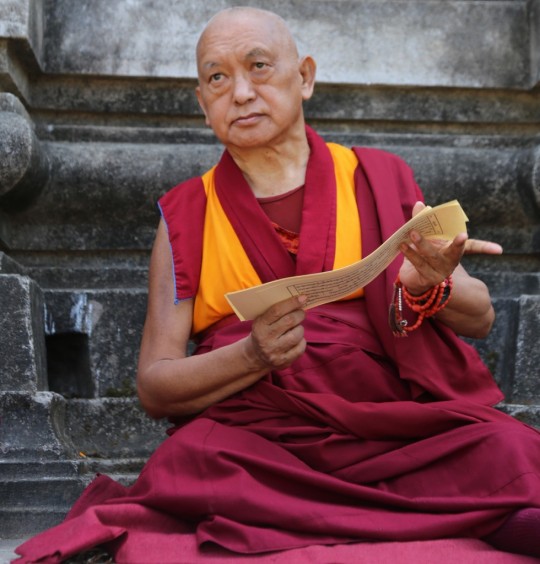
Lama Zopa Rinpoche at the Mahabodhi Stupa, Bodhgaya, India, March 2015. Photo by Ven. Thubten Kunsang.
“I am very happy to hear that you immediately rushed to read the sutras. That made me so extremely happy. That means you are truly a very devoted student, maybe not quite truly existent. Please keep reading the sutras, even one line or one page a day. It has so much meaning,” Lama Zopa Rinpoche wrote to a student, who had written to Rinpoche after he sent her three sutras (the Sutra of Golden Light, the Sanghata Sutra, and Vajra Cutter Sutra).
“Reading the sutras will help you so much. It is the easiest way to direct your life toward enlightenment and toward enlightening all sentient beings, so it has so much benefit, even benefit for your nose.”
FPMT Education Services has created the “Sutras” webpage, which is full of links to various sutra texts and advice from Lama Zopa Rinpoche on reading sutras plus other resources: https://fpmt.org/education/prayers-and-practice-materials/sutras/
Read more advice from Rinpoche on sutras in “Lama Zopa Rinpoche’s Online Advice Book,” part of the Lama Yeshe Wisdom Archive. The text above can be found at: http://bit.ly/various-sutras
Learn more about FPMT spiritual director Lama Zopa Rinpoche and his beneficial activities by visiting Rinpoche’s webpage, where you will find links to Rinpoche’s schedule, new advice, recent video, photos and more.
- Tagged: lama zopa rinpoche, sutras
- 0
20
Destroying Delusions
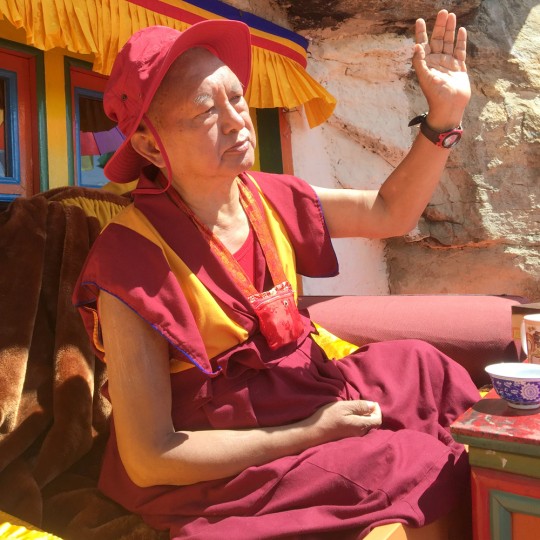
Lama Zopa Rinpoche describing some of his ideas for Lawudo Gompa and Retreat Centre, Nepal, April 2015. Photo by Ven. Roger Kunsang.
Lama Zopa Rinpoche offered the following advice on the value of retreat during lunchtime at one of His Holiness the Dalai Lama’s teachings on “The Wheel of Sharp Weapons”:
You should always remember retreat means making war on delusions. You have to always remember this – this is inner war, but this is a one-time war. Once you defeat delusion by eliminating the cause, the seed of delusion, by actualizing the remedy, the path, it doesn’t come back again; once the seed is removed, delusion never comes back, so this is just a one-time war. The outside, external wars are endless, because you have to fight them again and again.
In Shantideva’s Bodhisattvacaryavatara, he mentions that the outside enemy never ends, never finishes, however much you are able to kill him or her. Shantideva used the example that if the whole earth is covered by thorns, there is not enough leather to cover the whole earth with leather, but if you have leather under your foot, it’s like the whole earth is covered by leather. Shantideva said that the meaning of this is that once the inner enemy, the delusions are destroyed, all the outside enemies are destroyed.
You can read more about this topic from Lama Zopa Rinpoche on the Lama Yeshe Wisdom Archive‘s “Retreat Advice” page: https://www.lamayeshe.com/index.php?sect=article&id=326#sthash.Y9xAoI1w.dpuf/.
More information, photos and updates about FPMT spiritual director Lama Zopa Rinpoche can be found on Rinpoche’s webpage. If you’d like to receive news of Lama Zopa Rinpoche via email, sign up to Lama Zopa Rinpoche News.
- Tagged: lama zopa rinpoche, retreat
- 0
17
Making Homage to the Relics [Video]
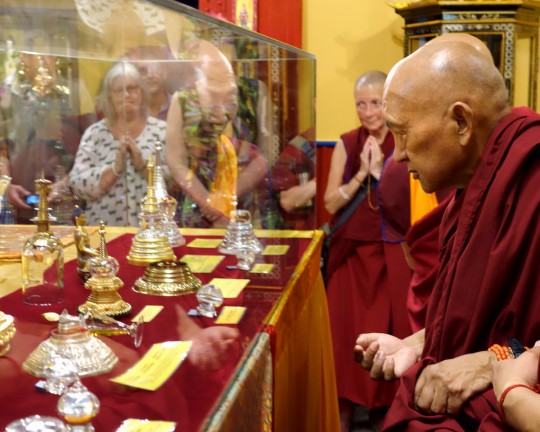
Lama Zopa Rinpoche viewing relics of Buddhist masters displayed in the newly remodeled relic room in the exhibition center at the Great Stupa of Universal Compassion, Bendigo, Australia, October 2014. Photo by Ven. Roger Kunsang.
In the Sutra of Golden Light, Chapter 18, it says:
“Then the Tathagata struck the surface of the earth with his hand, whose palm was soft as the newly bloomed lotus and marked with a thousand-spoked wheel. As soon as he struck it, the earth shook in six ways and there arose a stupa made of silver, gold and jewels. Then the Tathagata said to the Venerable Ananda: ‘Ananda, open this stupa.’ Heeding these instructions, the Venerable Ananda opened the stupa. Inside he saw an urn covered with gold and inlaid with jewels and pearls. Having seen this, he said to the Tathagata, ‘O Transcendent Lord, there is an urn made of gold.’ The Tathagata said, ‘Open these seven urns.’ Accordingly, he opened them. He saw relics whose colors were like snow and white lily. Seeing this, the Venerable Ananda said to the Tathagata, ‘O Transcendent Lord, there are relics.’ Then the Tathagata said, ‘Ananda, bring here the relics of the great being.’ Then the Venerable Ananda took those relics and brought them to the Tathagata. Taking the relics to the thousand bhikshus and holding them in his hand, the Tathagata addressed them in this way:
Here are the bones of one endowed with excellent virtue and supreme intellect,
Humility, meditation, delight through patience and sublime fame;
One who continually strove for the wisdom of his enlightenment;
Intelligent and possessing steadfast joyous perseverance,
He always delighted in giving.
“Then the Tathagata said this to the thousand bhikshus: ‘O bhikshus, offer homage to the bodhisattva’s relics fully charged with ethics and virtue, which are a field of merit and extremely rare to see.’ Then, their hearts filled with aspiration, those bhikshus paid homage to the relics with hands folded in reverence.”
Watch a short video clip of Lama Zopa Rinpoche doing prayers in front of the relics at the Great Stupa of Universal Compassion in Bendigo, Australia.
Learn more about Lama Zopa Rinpoche, spiritual director of the Foundation for the Preservation of Mahayana Tradition (FPMT), and Rinpoche’s vision for a better world. Sign up to receive news and updates.
- Tagged: golden light sutra, great stupa of universal compassion, lama zopa rinpoche, relics, sutra of golden light, video
- 0
16
Lawudo Family Reunion
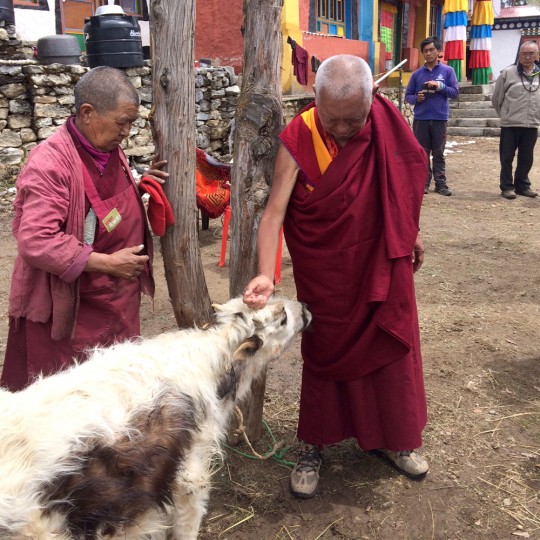
Lama Zopa Rinpoche with his sister, Ani Samten, blessing a Lawudo cow. Rinpoche’s brother Sangay Sherpa looks on in the background, Lawudo Gompa and Retreat Centre, Solu Khumbu, Nepal, April 2015. Photo by Harry Sutton.
Lama Zopa Rinpoche’s current visit to Lawudo Gompa and Retreat Centre in Solu Khumbu, Nepal, is special for many reasons. Lawudo cave was the meditation cave of Rinpoche’s previous incarnation Kunsang Yeshe, more commonly known as the Lawudo Lama. Rinpoche was born not far from Lawudo and has a close affinity with the Sherpa people in the area. But also, Rinpoche’s sister and brother are integral to Lawudo’s continued existence and they are all together during Rinpoche’s visit.
Ani Ngawang Samten, Rinpoche’s older sister, has overseen all of the development at Lawudo and has taken care of the students, teachers and retreaters who have visited Lawudo since the early days of FPMT. Back then, she carried stones and helped build the gompa at Lawudo. And for four decades, she has cooked the food and made sure that visitors have what they need. Ven. Roger Kunsang, CEO of FPMT and Rinpoche’s assistant, has called her the “mother” of Lawudo.
Anila also lovingly takes care of the cows. One day during Rinpoche’s visit, he went to the dining room at breakfast and talked to all gathered there about the benefits of not killing and of a vegetarian diet. Then Rinpoche went out and blessed all of the cows until lunch time.
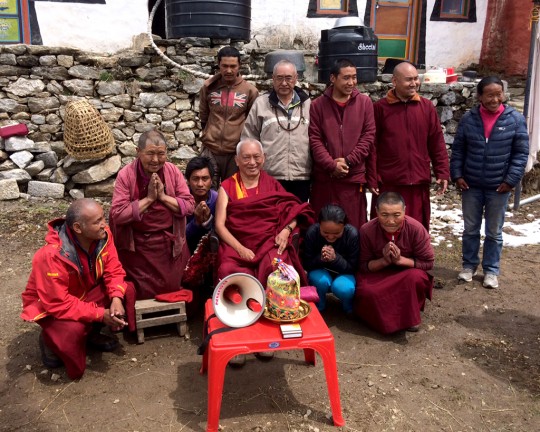
Lama Zopa Rinpoche with his sister Ani Ngawang Samten (kneeling to the left of Rinpoche) and his brother Sangay Sherpa (in the tan jacket behind Rinpoche) along with other Sherpas at Lawudo, Solu Khumbu, Nepal, April 2015. Photo by Harry Sutton.
Rinpoche’s brother, Sangay Sherpa, serves as the director of Lawudo and has been responsible for the recent building work, which includes building a new library and restoring the old gompa. The harsh environment and high altitude create many challenges for construction. Materials must be flown in from Kathmandu to Lukla by plane or to Syangboche by helicopter and then brought up to Lawudo on the backs of yaks and Sherpa porters.
Rinpoche’s visit to Lawudo is truly a homecoming and a rare opportunity for a reunion with his family, who continue to quietly keep the fires burning at this very special place.
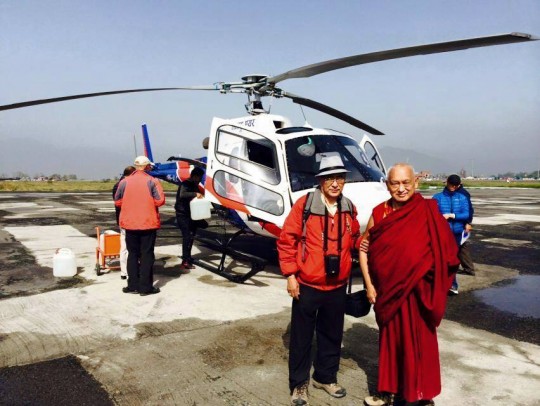
Lama Zopa Rinpoche and his brother Sangay Sherpa at the Kathmandu airport before flying up to Lawudo, Nepal, April 2015. Photo by Ven. Lobsang Sherab.
Anila’s amazing contributions and work at Lawudo have been celebrated and described by Merry Colony, long-time student and former director of FPMT Education Services, in the Mandala January-February 1998 article, “The Keeper of Lawudo.”
Lama Zopa Rinpoche is the spiritual director of the Foundation for the Preservation of Mahayana Tradition (FPMT), a Tibetan Buddhist organization dedicated to the transmission of the Mahayana Buddhist tradition and values worldwide through teaching, meditation and community service.
- Tagged: ani ngawang samten, fpmt history, lama zopa rinpoche, lawudo, sangay sherpa
- 0
15
Practice Awareness of Karma When You Walk Outside
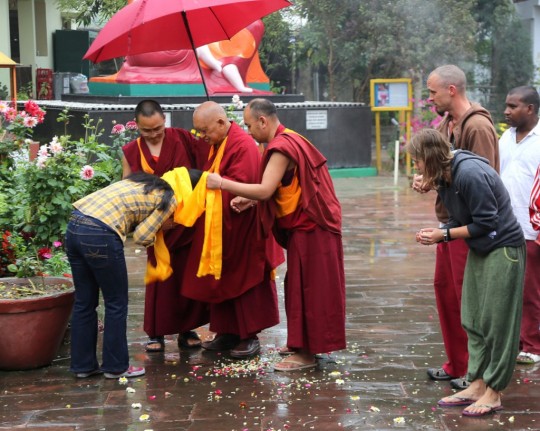
Lama Zopa Rinpoche, Root Institute, Bodhgaya, India, March 2015. Photo by Ven. Thubten Kunsang.
“When you are working outside and see a beautiful flower that pleases you, that is your karmic view,” said Lama Zopa Rinpoche during the 16th Kopan course in 1983. “That view comes from your own mind, from virtuous thoughts. Anything which is disagreeable and disturbing to you is the result of bad thoughts in the past – negative karma. Whenever you experience sense objects – good smells, bad smells, when eating food, when looking around at views, practice awareness. When you see people or animals: when you see one person it makes you happy, another makes you unhappy. If one person is helping you, think, ‘This is the result of my good karma, of having the right attitude.’ If somebody makes you unhappy, think, ‘This is the result of my negative karma, the bad thoughts.’ It is so obvious, so clear, how liking or not liking, seeing something as nice or not nice, is dependent on your mind. When some people look at a particular person, they find him so nice, beautiful, good and so on; at the same time when others look at him they find him completely ugly, not worth being attached to! They see the one person in different ways.
“Let’s say you’re in prison and somebody unknown helps you get free. You see that person afterwards but you don’t see him as kind, you don’t have a warm feeling; but when you hear that he is the one that helped when you had troubles, suddenly you see him in a different way. You see him as having a warm beauty, as kind. For your mind, the person becomes nearer. Similarly, when a person is disturbing you, you see him as ugly, very bad, negative, black; but if you think of his kindness in destroying your selfish attitude, your bad thoughts, the view changes. He becomes closer and you feel warmth and kindness from the heart. Now you can see how it’s dependent on the mind. When you change your way of thinking, you will see things in a different way. With one way of thinking you see in one way, with another way of thinking you see in a different way. Some people see one place as very beautiful and like it, some see it as very ugly and undesirable.
“Like this, practice awareness of karma when you walk outside. When pleasure turns into suffering think that is the result of wrong attitudes, of negative karma. Also, you can maybe do meditations on all your past lives. Sometimes you had a good life, sometimes a horrible, terrifying, suffocating life, wanting to kill yourself. Then think, ‘All this came from the wrong attitude in my own mind.’
“We should use this awareness for something, for progressing the mind. We should use this awareness for more happiness, to decrease suffering, to lessen confusion. So, make the decision frequently, ‘This is the result of right attitudes. Therefore, what I should do from now on is renounce the non-virtuous mind as much as possible and practice the right attitude, a good heart, as much as possible.'”
Excerpted from the transcripts of Lecture 3 of the 16th Kopan course (http://bit.ly/16th-kopan-course) made available by the Lama Yeshe Wisdom Archive. Edited by Mandala for inclusion on FPMT.org.
Learn more about Lama Zopa Rinpoche, spiritual director of the Foundation for the Preservation of Mahayana Tradition (FPMT), and Rinpoche’s vision for a better world. Sign up to receive news and updates.
14
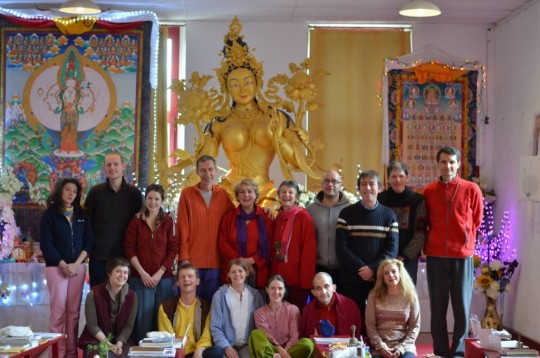
IVY students have completed 580 nyung näs since November 2014.
One of Lama Zopa Rinpoche’s Vast Visions for the FPMT organization is to sponsor others to complete 1,000 nyung nä retreats. Institute Vajra Yogini (IVY), France, upon hearing this incredible vision of Lama Zopa Rinpoche, immediately started hosting 108 nyung näs retreats a year. Now halfway into the fourth set of 108 retreats there is so much to rejoice in. Currently six people are committed to completing the whole 108 nyung näs. Nine people have so far done eight nyung näs or more. 66 people have done at least one nyung näs. 81 different participants in total have participated in one or more nyung näs and an incredible 580 individual nyung näs have already been accumulated.
On average, there are between 7 to 15 people participating in each single session of the nyung näs.
The Lama Zopa Rinpoche Bodhichitta Fund is sponsoring a number of the people to do the 108 nyung näs and recently sent over US$8,000 toward the sponsorship of food and lodging for individuals undertaking this practice. The students are dedicating the merits of their practice to Lama Zopa Rinpoche’s long life, good health, and for the immediate fulfillment of all of Rinpoche’s wishes.
This practice is a trillion, billion times greater than becoming an Olympic champion. Doing so many nyung näs you become an unbelievable champion. This is what makes numberless buddhas and bodhisattvas most happy and brings sentient beings to enlightenment as quickly as possible.
—Lama Zopa Rinpoche, May 2007
In 2008 Lama Zopa Rinpoche wrote a letter to a student who had just completed 200 nyung näs and was continuing on to complete 1,000. Please enjoy an excerpt from that letter:
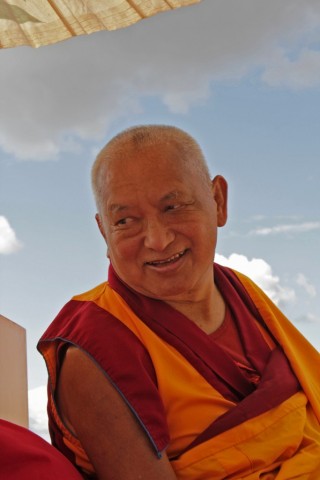
Lama Zopa Rinpoche, Washington, USA, July 2014. Photo by Ven. Lobsang Sherab.
Thank you for doing so many nyung näs….
What you have accomplished is really unbelievable, unbelievable, unbelievable! I wish I could do this some time, I think I have to meditate more on impermanence and death and on the lower realms and karma.
If you can finish these 1,000 it will be unbelievable, unbelievable. Shine [calm abiding] is just one small aspect of the path, but the nyung näs are a cause to achieve the path to enlightenment and to achieve all the qualities of Buddha, also so many eons of negative karma gets purified, 40,000 eons of negative karma are purified by just doing one nyung näs, then depending on how much compassion you generate and of course if you generate bodhichitta, then you can purify much more than that.
What you have done, the nyung näs, wow!! That is just amazing! A miracle, unbelievable, most unbelievable gift to His Holiness the Dalai Lama, to numberless buddhas and bodhisattvas, you can’t imagine how many hundreds of thousands of millions of many eons of negative karma that have gone by doing this, so many, many eons of negative karma have gone.
I hope you don’t feel you are missing the negative karma. I hope that you don’t fall asleep at night time and miss all those negative karmas. Sooner or later you will become a bodhisattva. So just like when someone wins soccer, when all the people jump up, clapping their hands, many tens of thousands of people clapping their hands, so in the same way all the buddhas and bodhisattvas are clapping their hands, from the ten directions, even from the pure lands.
This is your best offering, best service to sentient beings; this is how you collect most extensive merit. Doing all those practices, prostrations it is unbelievable purification, by reciting the names of the 35 Buddhas, Chenrezig meditation, recitation, by making offerings to Chenrezig, you collect the same amount of merit as having made offerings to all the buddhas, and then by taking the 8 Mahayana precepts on top … wow!!! Amazing, gorgeous!
Please download a free PDF, Praise and Prayer to Noble Avalokiteshvara in celebration of these amazing accomplishments by so many dedicated students who wish to support Lama Zopa Rinpoche’s Vast Vision.
Tremendous thanks to Francois and Violette and all at Institute Vajra Yogini for all they are doing to make the 108 nyung näs Vast Vision a reality, and also for supporting all the nyung näs participants, which is creating more bodhichitta in the world.
You can learn more about Lama Zopa Rinpoche’s Vast Vision for the FPMT organization, or about other beneficial activities of the Lama Zopa Rinpoche Bodhichitta Fund.
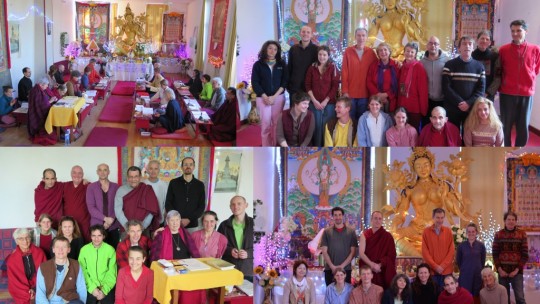
The dedicated nyung näs participants of IVY.
- Tagged: nyung nä, vast visions
- 0
14
An Easy Way to Benefit Animals
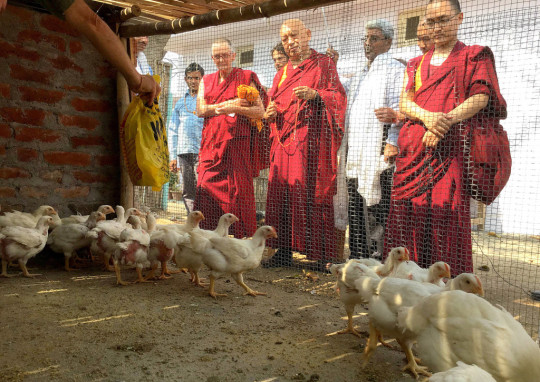
Lama Zopa Rinpoche spent time blessing the chickens at Root Institute, Bodhgaya, India, March 2015. Photo by Ven. Sarah Thresher.
“When Lama Zopa Rinpoche was traveling from Gaya airport to Root Institute on the day of his arrival in early February 2015, he noticed the roadside shops that sell live chickens,” said long-time student Ven. Sarah Thresher. “The chickens are crammed into small wire cages and sold to customers by the weight, either alive, or beheaded and ready to be eaten. Rinpoche immediately expressed his wish to liberate the chickens and gave instructions for a large coop to be built so they could wander around freely, but still be prevented from eating other creatures. While the coop was being constructed, Rinpoche wrote out by hand the Lotus Pinnacle of Amoghaspasha mantra (FPMT Education Services’ makes available a brief commentary on the mantra by Geshe Ngawang Dakpa; a pre-printed version with a short commentary by Lama Zopa Rinpoche is available through the Foundation Store) to be photocopied and pasted inside, covering the entire ceiling. The Namgyälma mantra was also included so that the birds would constantly purify their negative karma day and night. Lotus Pinnacle of Amoghaspasha mantra – OM PÄDMO USHNISHA VIMALE HUM PHAT – is usually hung over doorways and purifies eight trillion eons of negative karma by passing under it. By placing the Namgyälma mantra in a high place or in a room, it also purifies and blesses the people, animals or insects in that area, liberating them from the lower realms. Rinpoche has spoken extensively the Namgyälma mantra’s benefits.
“Over the course of the two months spent at Root, Rinpoche liberated 62 chickens and blessed all the animals – goats, cows, chickens, dogs, etc. – at Root and nearby MAITRI Charitable Trust by reciting prayers and mantras. Not just the chicken coop, but also the cow shed ceiling were covered with Lotus Pinnacle of Amoghapasha and Namgyälma mantras – such an easy way to benefit animals!”
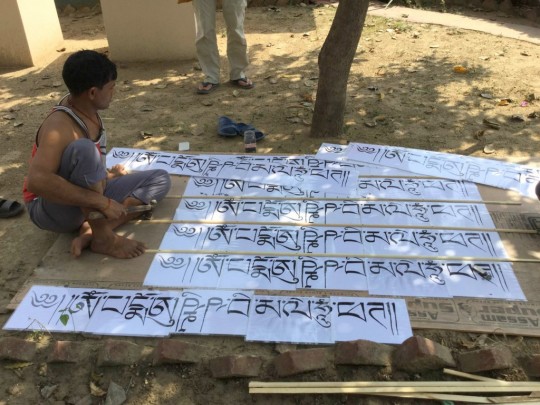
Mantras line the roof of the chicken coop at Root Institute, Bodhgaya, India, March 2015. Photo by Ven. Sarah Thresher.
Benefiting animals in any way possible is a priority for FPMT and one of Lama Zopa Rinpoche’s Vast Visions for the organization. Both the Lama Zopa Rinpoche Bodhichitta Fund and the Animal Liberation Fund support animal liberation activities around the world.
FPMT Education Services makes a variety of mantra-related resources available on FPMT.org.
Learn more about Lama Zopa Rinpoche, spiritual director of the Foundation for the Preservation of Mahayana Tradition (FPMT), and Rinpoche’s vision for a better world. Sign up to receive news and updates.
13
A Hundred Eons Is Nothing
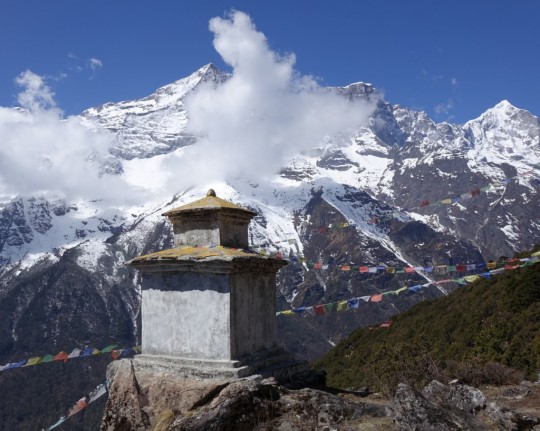
The previous Lawudo Lama’s stupa, a short walk from Lawudo Gompa, Solu Khumbu, Nepal, April 2015. Photo by Ven. Roger Kunsang.
“How can you recover completely from the heavy disease of the disturbing, unsubdued mind, which has been there from beginningless previous lifetimes?” Lama Zopa Rinpoche asked during the 12th Kopan course in 1979. “How can you recover within one month, within seven days or several years? For an ordinary, chronic disease like cancer and T.B. – which the person wasn’t born with – even for those diseases, the person should have treatment for many years, has to be very careful and should have powerful and long treatment.
“To completely make non-existent the disease of the disturbed, unsubdued mind, which has been there from beginningless previous lifetimes, which has no beginning, the treatment, listening to the holy Dharma and practicing the holy Dharma, of course, is extremely worthwhile. It is necessary to have powerful treatment, the powerful Dharma practice, even if it takes hundreds of lifetimes or a hundred eons. Even it if takes that much to take treatment, to completely make non-existent the heavy disease of the delusions, of course, it is extremely important. It is extremely important and it is worthwhile, even though it takes a hundred lifetimes, a hundred eons, which is nothing.
“Even if it takes a hundred eons to completely eradicate, to completely recover from the disease of the delusions and to be free from samsara, even though it takes a hundred eons, that still is very quick, very short if you think how many eons one has been sick with the delusions of the disturbed, unsubdued mind.”
Excerpted from the transcripts of Section Three of the 12th Kopan course (http://bit.ly/12th-kopan-course) made available by the Lama Yeshe Wisdom Archive. Edited by Mandala for inclusion on FPMT.org.
Learn more about Lama Zopa Rinpoche, spiritual director of the Foundation for the Preservation of Mahayana Tradition (FPMT), and Rinpoche’s vision for a better world. Sign up to receive news and updates.
10
Rinpoche’s Pillar Altar
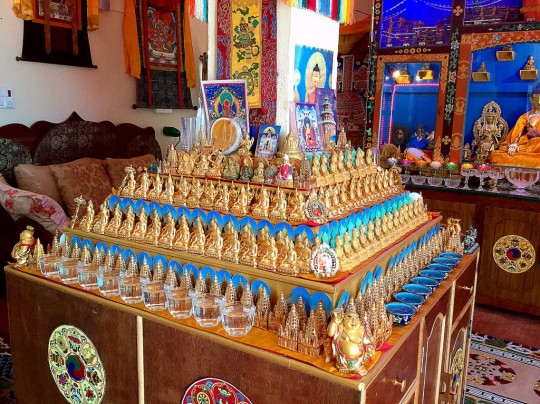
Lama Zopa Rinpoche designed this altar that surrounds a support pillar in his room at Root Institute, Bodhgaya, India, March 2015. Photo by Ven. Sarah Thresher.
“When Rinpoche’s room at Root Institute in Bodhgaya, India, was expanded, a support pillar was left exposed in the middle of the room,” said long-time student Ven. Sarah Thresher, who has been sharing news of Rinpoche’s activities in Bodhgaya. “Rinpoche promptly designed a special altar with levels surrounding all four sides of the pillar that could hold many holy objects and be circumambulated every time anyone walks around the room.
“The finished altar also has the eight auspicious signs all around, offering bowls on each side and cupboards to store incense and other items. Each of the small metal Buddhas is filled with many mantras and blessed. On Rinpoche’s instructions, holes were drilled into the bottom of each golden stupa for the four dharmakaya relic mantras to be inserted. Rinpoche particularly wanted the Stainless Beam mantra [Zung of the Exalted Completely Pure Stainless Light] to be put inside the small stupas since the benefits are so great. The idea is that people can carry these stupas with them as they circumambulate.”
Learn more about Lama Zopa Rinpoche, spiritual director of the Foundation for the Preservation of Mahayana Tradition (FPMT), and Rinpoche’s vision for a better world. Sign up to receive news and updates.
- Tagged: lama zopa rinpoche, root institute, ven. sarah thresher
- 0
9
Lama Zopa Rinpoche Visits Lawudo
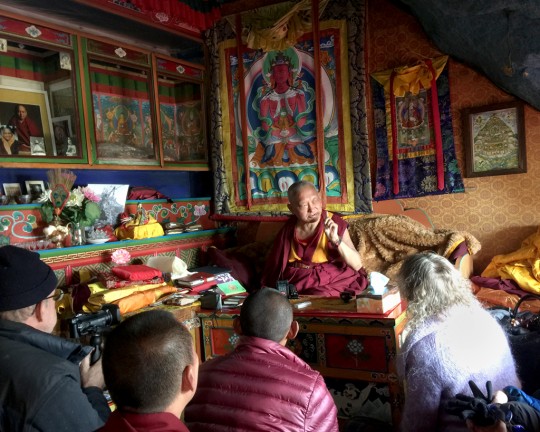
Lama Zopa Rinpoche talking about the previous Lawudo Lama in his meditation cave, Lawudo, Solu Khumbu, Nepal, April 2015. Photo by Ven. Roger Kunsang.
On April 4, Ven. Roger Kunsang shared via Twitter that FPMT spiritual director Lama Zopa Rinpoche was boarding a helicopter bound for Lawudo Gompa and Retreat Centre, located in the mountainous Solu Khumbu region of Nepal. Lawudo is where Rinpoche’s previous incarnation Lawudo Lama Kunsang Yeshe meditated for 20 years, and it is also near to where Rinpoche was born.
Rinpoche’s visit is big news as his last trip to Lawudo was in June 2008. Not only is Rinpoche’s presence there very important to the Sherpa people in the area, Rinpoche is returning to an essential location in FPMT’s history. “Lawudo is the heart where FPMT started,” Rinpoche has said. Online, you can read the story of Rinpoche’s 1998 visit, “The Lawudo Lama Returns,” and other Mandala stories on Lawudo.
In addition to blog posts on FPMT.org, photos of Rinpoche from his visit to Lawudo are being shared over social media and many can be seen by visiting Lama Zopa Rinpoche’s Facebook page.
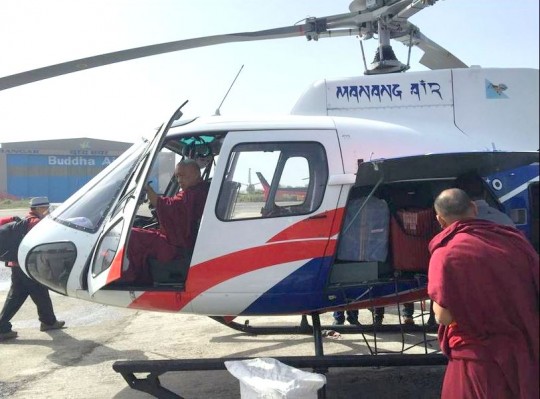
Lama Zopa Rinpoche boarding the helicopter for Lawudo, Nepal, April 2014. Photo by Ven. Roger Kunsang.
More information, photos and updates about FPMT spiritual director Lama Zopa Rinpoche can be found on Rinpoche’s homepage. If you’d like to receive news of Lama Zopa Rinpoche via email, sign up to Lama Zopa Rinpoche News.
- Tagged: lama zopa rinpoche, lawudo, twitter
- 0
8
The Base, the Label and the Mind
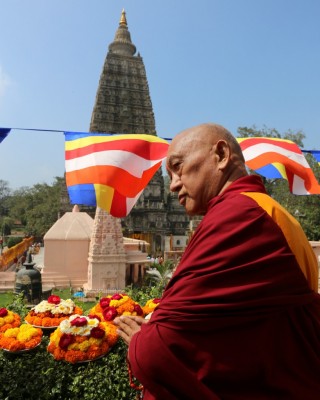
Lama Zopa Rinpoche, Mahabodhi Stupa, Bodhgaya, India, March 2105. Photo by Ven. Thubten Kunsang.
During the 25th Kopan course in 1992 Lama Zopa Rinpoche gave a concise explanation of dependent arising, the way in which things exist:
Lama Tsongkhapa says, “By seeing the meaning of the dependent arising, emptiness, it stops the root of all the samsaric beings’ sufferings, ignorance, concept of true existence.” Whatever exists – hell, enlightenment, samsara, nirvana, I, action, object, everything – whatever exists, all these are dependent arising. By depending on the base, the mind which labels and the label, depending on these things, then the I exists, the action exists, the object exists, hell exists, enlightenment exists, samsara exists, nirvana exists, impermanent phenomena, permanent phenomena, all these things exist. All these things exist. So, depending on these three – base, mind, label – depending on these things then it exists. Depending on these things, all these things exist or arise.
Excerpted from the transcripts of the 25th Kopan course (http://bit.ly/25th-kopan-course) made available by the Lama Yeshe Wisdom Archive. Lightly edited by Mandala for inclusion on FPMT.org.
Learn more about Lama Zopa Rinpoche, spiritual director of the Foundation for the Preservation of Mahayana Tradition (FPMT), and Rinpoche’s vision for a better world. Sign up to receive news and updates.
- Tagged: dependent arising, emptiness, kopan course, lama zopa rinpoche
- 0
- Home
- News/Media
- Study & Practice
- About FPMT Education Services
- Latest News
- Programs
- New to Buddhism?
- Buddhist Mind Science: Activating Your Potential
- Heart Advice for Death and Dying
- Discovering Buddhism
- Living in the Path
- Exploring Buddhism
- FPMT Basic Program
- FPMT Masters Program
- FPMT In-Depth Meditation Training
- Maitripa College
- Lotsawa Rinchen Zangpo Translator Program
- Universal Education for Compassion & Wisdom
- Online Learning Center
- Prayers & Practice Materials
- Overview of Prayers & Practices
- Full Catalogue of Prayers & Practice Materials
- Explore Popular Topics
- Benefiting Animals
- Chenrezig Resources
- Death & Dying Resources
- Lama Chopa (Guru Puja)
- Lama Zopa Rinpoche: Compendium of Precious Instructions
- Lama Zopa Rinpoche: Life Practice Advice
- Lama Zopa Rinpoche Practice Series
- Lamrim Resources
- Mantras
- Prayer Book Updates
- Purification Practices
- Sutras
- Thought Transformation (Lojong)
- Audio Materials
- Dharma Dates – Tibetan Calendar
- Translation Services
- Publishing Services
- Teachings and Advice
- Find Teachings and Advice
- Lama Zopa Rinpoche Advice Page
- Lama Zopa Rinpoche: Compendium of Precious Instructions
- Lama Zopa Rinpoche Video Teachings
- ༧སྐྱབས་རྗེ་བཟོད་པ་རིན་པོ་ཆེ་མཆོག་ནས་སྩལ་བའི་བཀའ་སློབ་བརྙན་འཕྲིན།
- Podcasts
- Lama Yeshe Wisdom Archive
- Buddhism FAQ
- Dharma for Young People
- Resources on Holy Objects
- Ways to Offer Support
- Centers
- Affiliates Area
- Teachers
- Projects
- Charitable Projects
- Make a Donation
- Applying for Grants
- News about Projects
- Other Projects within FPMT
- Support International Office
- Projects Photo Galleries
- Give Where Most Needed
- FPMT
- Shop
Translate*
*powered by Google TranslateTranslation of pages on fpmt.org is performed by Google Translate, a third party service which FPMT has no control over. The service provides automated computer translations that are only an approximation of the websites' original content. The translations should not be considered exact and only used as a rough guide.Faith alone never stops problems; understanding knowledge-wisdom always does. Lord Buddha himself said that belief in Buddha was dangerous; that instead of just believing in something, people should use their minds to try to discover their own true nature.







